- Home
- Lucius Shepard
Stars Seen Through Stone Page 5
Stars Seen Through Stone Read online
Page 5
Andrea hugged herself. “I could use something hot to drink.”
McGuigan’s was handy, but that would have disincluded Pin, who obviously was underage. I loaded him, Stanky, and Liz into the back of the van and drove to Szechuan Palace, a restaurant on the edge of the business district, which sported a five-foot-tall gilt fiberglass Buddha in the foyer that over the years had come to resemble an ogre with a skin condition, the fiberglass weave showing through in patches, and whose dining room (empty but for a bored wait-staff) was lit like a Macao brothel in lurid shades of red, green, and purple. On the way to the restaurant, I replayed the incident in my head, attempting to understand what I had witnessed not in rational terms, but in terms that would make sense to an ordinary American fool raised on science fiction and horror movies. Nothing seemed to fit. At the restaurant, Andrea and Pin ordered tea, Liz and Stanky gobbled moo shu pork and lemon chicken, and I picked at an egg roll. Pin started talking to Andrea in an adenoidal voice, lecturing her on some matter regarding Black William, and, annoyed because he was treating her like an idiot, I said, “What does Black William have to do with this?”
“Not a thing,” Pin said, turning on me a look of disdain that aspired to be the kind of look Truman Capote once fixed upon a reporter from the Lincoln Journal-Star who had asked if he was a homosexual. “Not unless you count the fact that he saw something similar two hundred years ago and it probably killed him.”
“Pin’s an expert on Black William,” Stanky said, wiping a shred of pork from his chin.
“What little there is to know,” said Pin grandly, “I know.”
It figured that a Goth townie would have developed a crush on the local bogeyman. I asked him to enlighten me.
“Well,” Pin said, “when Joey told me he’d seen a star floating in front of the library, I knew it had to be one of BW’s stars. Where the library stands today used to be the edge of Stockton Wood, which had an evil reputation. As did many woods in those days, of course. Stockton Wood is where he saw the stars.”
“What did he say about them?”
“He didn’t say a thing. Nothing that he committed to paper, anyway. It’s his younger cousin, Samuel Garnant, we can thank for the story. He wrote a memoir about BW’s escapades under the nom de plume Jonathan Venture. According to Samuel, BW was in the habit of riding in the woods at twilight. ‘Tempting the Devil,’ he called it. His first sight of the stars was a few mysterious lights—like with you and Joey. He rode out into the wood the next night and many nights thereafter. Samuel’s a bit vague on how long it was before BW saw the stars again. I’m guessing a couple of weeks, going by clues in the narrative. But eventually he did see them, and what he saw was a lot like what we just saw.” Pin put his hands together, fingertips touching, like a priest preparing to address the Ladies Auxiliary. “In those days, people feared God and the Devil. When they saw something amazing, they didn’t stand around like a bunch of doofuses saying, ‘All right!’ and taking pictures. BW was terrified. He said he’d seen the Star Wormwood and heard the Holy Ghost moan. He set about changing his life.”
Stanky shot me one of his wincing, cutesy, embarrassed smiles—he had told me the song was completely original.
“For almost a year,” Pin went on, “BW tried to be a good Christian. He performed charitable works, attended church regularly, but his heart wasn’t in it. He lapsed back into his old ways and before long he took to riding in Stockton Woods again, with his manservant Nero walking at his side. He thought that he had missed an opportunity and told Samuel if he was fortunate enough to see the stars again, he would ride straight for them. He’d embrace their evil purpose.”
“What you said about standing around like doofuses, taking pictures,” Andrea said. “I don’t suppose anyone got a picture?”
Pin produced a cell phone and punched up a photograph of the library and the stars. Andrea and I leaned in to see.
“Can you e-mail that to me?” I asked.
Pin said he could and I wrote my address on a napkin.
“So,” Pin said. “The next time BW saw the stars was in eighteen-oh-eight. He saw them twice, exactly like the first time. A single star, then an interval of week or two and a more complex sighting. A month after that, he disappeared while riding with Nero in Stockon Wood and they were never seen again.”
Stanky hailed our waitress and asked for more pancakes for his moo shu.
“So you think the stars appeared three times?” said Andrea. “And Black William missed the third appearance on the first go-round, but not on the second?”
“That’s what Samuel thought,” said Pin.
Stanky fed Liz a bite of lemon chicken.
“You’re assuming Black William was killed by the stars, but that doesn’t make sense,” said Andrea. “For instance, why would there be a longer interval between the second and third sightings? If there was a third sighting. It’s more likely someone who knew the story killed him and blamed it on the stars.”
“Maybe Nero capped him,” said Stanky. “So he could gain his freedom.”
Pin shrugged. “I only know what I read.”
“It might be a wavefront,” I said.
On another napkin, I drew a straight line with a small bump in it, then an interval in which the line flattened out, then a bigger bump, then a longer interval and an even bigger bump.
“Like that, maybe,” I said. “Some kind of wavefront passing through Black William from God knows where. It’s always passing through town, but we get this series of bumps that make it accessible every two hundred years. Or less. Maybe the stars appeared at other times.”
“There’s no record of it,” said Pin. “And I’ve searched.”
The waitress brought Stanky’s pancakes and asked if we needed more napkins.
Andrea studied the napkin I’d drawn on. “But what about the first series of sightings? When were they?”
“Seventeen-eighty-nine,” said Pin.
“It could be an erratic cycle,” I said. “Or could be the cycle consists of two sequences close together, then a lapse of two hundred years. Don’t expect a deeper explanation. I cut class a bunch in high school physics.”
“The Holy Ghost doesn’t obey physical principles,” said Stanky pompously.
“I doubt Black William really heard the Holy Ghost,” Andrea said. “If he heard what we heard tonight. It sounded more like a door closing to me.”
“Whatever,” he said. “It’ll be cool to see what happens a month from now. Maybe Black William will return from the grave.”
“Yeah.” I crumpled the napkin and tossed it to the center of the table. “Maybe he’ll bring Doctor Doom and the Lone Ranger with him.”
Pin affected a shudder and said, “I think I’m busy that day.”
Pin sent me the picture and I emailed it to a gearhead friend, Crazy Ed, who lived in Wilkes-Barre, to see what he could make of it. Though I didn’t forget about the stars, I got slammed with business and my consideration of them and the late William Garnant had to be put on the backburner, along with Stanky’s career. Against all expectations, Liz had not fled screaming from his bed, crying Pervert, but stayed with him most nights. Except for his time in the studio, I rarely saw him, and then only when his high school fans drove by to pick up him and Liz. An apocryphal story reached my ear, insinuating that she had taken on a carload of teenage boys while Stanky watched. That, if true, explained the relationship in Stanky-esque terms, terms I could understand. I didn’t care what they did as long as he fulfilled his band duties and kept out of my hair. I landed him a gig at the Pick and Shovel in Waterford, filling in for a band that had been forced to cancel, and it went well enough that I scored him another gig at Garnant College. After a mere two performances, his reputation was building and I adjusted my timetable accordingly—I would make the college job an EP release party, push out an album soon thereafter and try to sell him to a major label. It was not the way I typically grew my acts, not commercially wise, but Stanky was no
t a typical act and, despite his prodigious talent, I wanted to have done with this sour-smelling chapter in my life.
Andrea, for all intents and purposes, had moved in, along with a high-energy, seven-month-old Irish Setter named Timber, and was in process of subletting her apartment. We were, doubtless, a disgusting item to everyone who had gotten to know us during our adversarial phase, always hanging on one another, kissing and touching. I had lunch with her every day—they held the back booth for us at McGuigan’s—and one afternoon as we were settling in, Mia materialized beside the booth. “Hello,” she said and stuck out a hand to Andrea.
Startled, Andrea shook her hand and I, too, was startled—until that moment, Mia had been unrelentingly hostile in her attitude toward my ex, referring to her as “that uppity skank” and in terms less polite. I noticed that she was dressed conservatively and not made up as an odalisque. Instead of being whipped into a punky abstraction, her hair was pulled back into a ponytail. The raspberry streak was gone. She was, in fact, for the first time since I had known her, streakless.
“May I join you?” Mia asked. “I won’t take up much of your time.”
Andrea scooted closer to the wall and Mia sat next to her.
“I heard you guys were back together,” said Mia. “I’m glad.”
Thunderstruck, I was incapable of fielding that one. “Thanks,” said Andrea, looking to me for guidance.
Mia squared up in the booth, addressing me with a clear eye and a firm voice. “I’m moving to Pittsburgh. I’ve got a job lined up and I’ll be taking night classes at Pitt, then going full-time starting next summer.”
Hearing this issue from Mia’s mouth was like hearing a cat begin speaking in Spanish while lighting a cheroot. I managed to say, “Yeah, that’s…. Yeah. Good.”
“I’m sorry I didn’t tell you sooner. I’m leaving tomorrow. But I heard you and Andrea were together, so….” She glanced back and forth between Andrea and myself, as if expecting a response.
“No, that’s fine,” I said. “You know.”
“It was a destructive relationship,” she said with great sincerity. “We had some fun, but it was bad for both of us. You were holding me back intellectually and I was limiting you emotionally.”
“You’re right,” I said. “Absolutely.”
Mia seemed surprised by how smoothly things were going, but she had, apparently, a prearranged speech and she by-God intended to give it.
“I understand this is sudden. It must come as a shock…”
“Oh, yeah.”
“…but I have to do this. I think it’s best for me. I hope we can stay friends. You’ve been an important part of my growth.”
“I hope so, too.”
There ensued a short and—on my end, anyway—baffled silence.
“Okay. Well, I … I guess that’s about it.” She got to her feet and stood by the booth, hovering; then—with a sudden movement—she bent and kissed my cheek. “Bye.”
Andrea put a hand to her mouth. “Oh my God! Was that Mia?”
“I’m not too sure,” I said, watching Mia walk away, noting that there had been a complete absence of moues.
“An important part of her growth? She talks like a Doctor Phil soundbyte. What did you do to her?”
“I’m not responsible, I don’t think.” I pushed around a notion that had occurred to me before, but that I had not had the impetus to consider more fully. “Do you know anyone who’s exhibited a sudden burst of intelligence in the past few weeks? I mean someone who’s been going along at the same pace for a while and suddenly they’re Einstein. Relatively speaking.”
She mulled it over. “As a matter of fact, I do. I know two or three people. Why?”
“Tell me.”
“Well, there’s Jimmy Galvin. Did you hear about him?”
“The gardening tool. Yeah. Who else?”
“This guy in my office. A paralegal. He’s a hard worker, but basically a drone. Lately, whenever we ask him to dig up a file or find a reference, he’s attached some ideas about the case we’re working on. Good ideas. Some of them are great. Case-makers. He’s the talk of the office. We’ve been joking that maybe we should get him to take a drug test. He’s going back to law school and we’re going to miss….” She broke off. “What’s this have to do with the new Mia?”
I told her about Rudy’s cartoons, Beth’s novel, Kiwanda’s newfound efficiency, the millworker, Stanky’s increased productivity.
“I can’t help wondering,” I said, “if it’s somehow related to the stars. I know it’s a harebrained idea. There’s probably a better explanation. Stanky … he never worked with a band before and that may be what’s revving his engines. But that night at the Crucible, he was so polished. It just didn’t synch with how I thought he’d react. I thought he’d get through it, but it’s like he was an old hand.”
Andrea looked distressed.
“And not everybody’s affected,” I said. “I’m not, for sure. You don’t seem to be. It’s probably bullshit.”
“I know of another instance,” she said. “But if I tell you, you have to promise to keep it a secret.”
“I can do that.”
“Do you know Wanda Lingrove?”
“Wasn’t she a friend of yours? A cop? Tall woman? About five years older than us?”
“She’s a detective now.”
The waitress brought our food. I dug in; Andrea nudged her salad to the side.
“Did you hear about those college girls dying over in Waterford?” she asked.
“No, I haven’t been keeping up.”
“Two college girls died a few days apart. One in a fire and one in a drowning accident. Wanda asked for a look at the case files. The Waterford police had written them off as accidents, but Wanda had a friend on the force and he slipped her the files and showed her the girls’ apartments. They both lived off-campus. It’s not that Wanda’s any great shakes. She has an undistinguished record. But she had the idea from reading the papers—and they were skimpy articles—a serial killer was involved. Her friend pooh-poohed the idea. There wasn’t any signature. But it turned out, Wanda was right. There was a signature, very subtle and very complicated, demonstrating that the killer was highly evolved. Not only did she figure that out, she caught him after two days on the case.”
“Aren’t serial killers tough to catch?”
“Yes. All that stuff you see about profiling on TV, it’s crap. They wouldn’t have come close to getting a line on this kid with profiling. He would have had to announce himself, but Wanda doesn’t think he would have. She thinks he would have gone on killing, that putting one over on the world was enough for him.”
“He was a kid?”
“Fourteen years old. A kid from Black William. What’s more, he’d given no sign of being a sociopath. Yet in the space of three weeks, he went from zero to sixty. From playing JV football to being a highly organized serialist. That doesn’t happen in the real world.”
“So how come Wanda’s not famous?”
“The college is trying to keep it quiet. The kid’s been bundled off to an institution and the cops have the lid screwed tight.” Andrea picked at her salad. “What I’m suggesting, maybe everyone is being affected, but not in ways that conform to your model. Wanda catching the kid, that conforms. But the kid himself, the fact that a pathology was brought out in him … that suggests that people may be affected in ways we don’t notice. Maybe they just love each other more.”
I laid down my fork. “Like with us?”
A doleful nod.
“That’s crazy,” I said. “You said you’d been plotting for months to make a move.”
“Yes, but it was a fantasy!”
“And you don’t think you would have acted on it?”
“I don’t know. One thing for certain, I never expected anything like this.” She cut her volume to a stage whisper. “I want you all the time. It’s like when we were nineteen. I’m addicted to you.”
“Yeah,”
I said. “Same here.”
“I worry that it’ll stop, then I worry that it won’t—it’s wreaking havoc with my work. I can’t stop thinking about you. On a rational level, I know I’m an animal. But there’s a place in me that wants to believe love is more than evolutionary biology. And now this thing with the stars. To think that what I’m feeling could be produced by something as random as a wavefront or a supernatural event, or whatever … It makes me feel like an experimental animal. Like a rabbit that’s been drugged. It scares me.”
“Look,” I said. “We’re probably talking about something that isn’t real.”
“No, it’s real.”
“How can you be sure? I only just brought the subject up. We can’t have been discussing it more than five minutes.”
“You convinced me. Everything you said rings true. I know it here.” Andrea touched a hand to her breast. “And you know it, too. Something’s happening to us. Something’s happening to this town.”
We stepped back from that conversation. It was, I suppose, a form of denial, the avoidance of a subject neither of us wished to confront, because it was proof against confrontation, against logic and reason, and so we trivialized it and fell back on our faith, on our mutuality. Sometimes, lying with Andrea, considering the join of her neck and shoulder, the slight convexity of her belly, the compliant curve of a breast compressed into a pouty shape by the weight of her arm, the thousand turns and angles that each seemed the expression of a white simplicity within, I would have the urge to wake her, to drive away from Black William, and thus protect her, protect us, from this infestation of stars; but then I would think that such an action might destroy the thing I hoped to protect, that once away from the stars we might feel differently about one another. And then I’d think how irrational these thoughts were, how ridiculous it was to contemplate uprooting our lives over so flimsy a fear. And, finally, having made this brief rounds of my human potential, I would lapse again into a Praxitelean scrutiny, a sculptor in love with his stone, content to drift in and out of a dream in which love, though it had been proved false (like Andrea said, an animal function and nothing more), proved to be eternally false, forever and a day of illusion, of two souls burning brighter and brighter until they appeared to make a single glow, a blazing unity concealed behind robes of aging flesh.

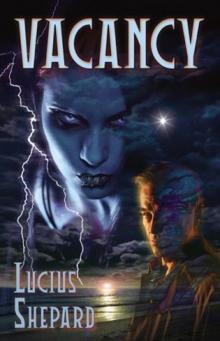 Vacancy & Ariel
Vacancy & Ariel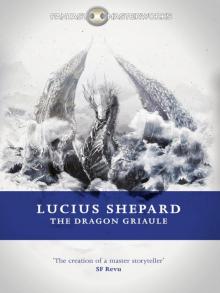 The Dragon Griaule
The Dragon Griaule The Ends of the Earth
The Ends of the Earth Two Trains Running
Two Trains Running Life of Buddha
Life of Buddha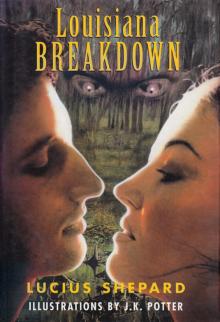 Louisiana Breakdown
Louisiana Breakdown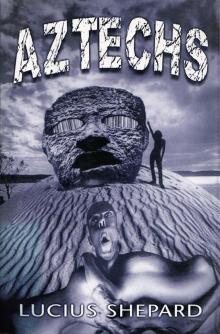 AZTECHS
AZTECHS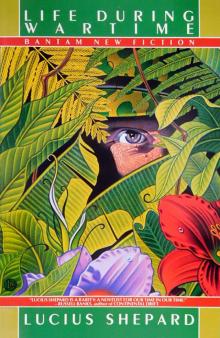 Life During Wartime
Life During Wartime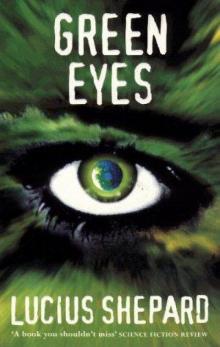 Green Eyes
Green Eyes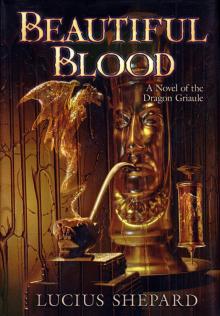 Beautiful Blood
Beautiful Blood Stars Seen Through Stone
Stars Seen Through Stone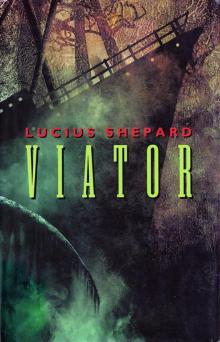 Viator
Viator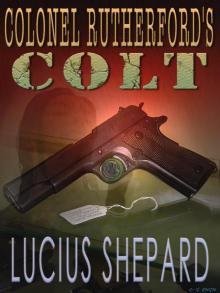 Colonel Rutherford's Colt
Colonel Rutherford's Colt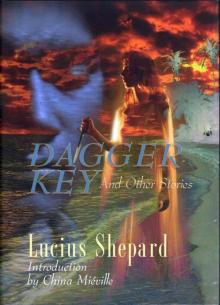 Dagger Key and Other Stories
Dagger Key and Other Stories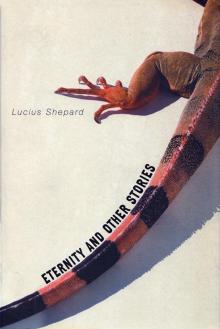 Eternity and Other Stories
Eternity and Other Stories Softspoken
Softspoken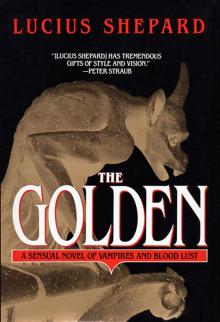 The Golden
The Golden